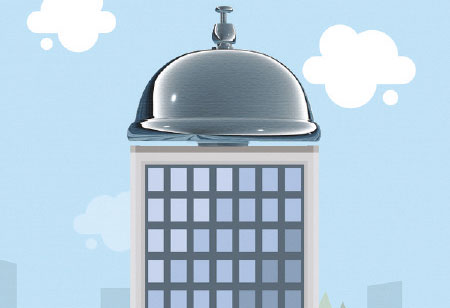Adding a 'Ding' to Hospitality
By Sanjoy Bhattacharya, Vice President & Head Global IT,
Kuoni Travel Group - Destination Management

Sanjoy Bhattacharya, Vice President & Head Global IT, Kuoni Travel Group - Destination Management
With over 17 years in the industry as an IT strategist, Sanjoy is specialized in managing IT across multi-nations and multi-cultural business centres. His expertise lies in IT Infrastructure, Networking, Application Development and Implementations of ERP.
History of hospitality in Indian culture
An affable smile, considerate gesture and radiating happiness upon receiving guests are just the silhouette of an Indian host. Besides the traditional importance, Hospitality has dissociated into a wide range of businesses that are dedicated to the service of people and are significantly contributing to the economic growth. Furthermore, the tourism industry is an amalgamation of five sectors namely:
• Accommodation (Hotels, Motels and Home-stays) where the stays may include catering, social activities, entertainment and meeting.
• Food and Beverage Services (Restaurant and Cafes),
• Recreation & entertainment (Theatres, Cinemas, Amusement Parks and Museums),
• Transportation (Pick-up, Drop-off and Rental) and
• Travel services (Travel agents, Destination Management Companies, Event Managers).
As we transitioned from one era to another, this traditional hospitality reflecting in the travel and tourism industry has improved and revolutionised with technology. It will not be wrong to state that the hospitality industry is broadly classified within the service industry inclusive of lodging, catering, transportation and entertainment, elements that are an explicit component of the hotel industry.
How it has evolved over the years in Indian market
Over the past years, there have been a number of new developments in specifically the hotel industry which are making the entire experience more efficient, entertaining and exuberating. Some of the progressions include:
1. Online Booking (Websites, Social Media, Blogs, Marketing, Networking)
Mobile phone check-in in hotel means guests can skip the front desk and go straight to their rooms, where they can swipe their phones to unlock the door. Travellers are able to book restaurants anywhere in the world, search for real-time availability, access up-to-date descriptions and images of the venue and read ratings and reviews.
2. EPOS (Electronic Point of Sale)
These allow hospitality venues to operate more efficiently and provide better customer service. Integrating systems for inventory management and information on capacity
3. CRM (Customer Relationship Management)
The CRM software is widely used to organise and manage all the contact and information in one place.
4. Marketing Automation
Sending personalised emails to customers and prospects based on their activities and personal information. Also, advanced marketing automation software performs tasks of web analytic tools by sending email to customers.
5. Social Media
Social media presence is crucial for an online presence and globalization. Platforms such as Facebook are popular for check-ins and reviews of restaurants and hotels.
6. Smart phones
The popularity and proliferation of smart phones is yet another element that has improved the customer service for hospitality businesses.
7. Smart Appliances
Tablet devices or applications have been developed to control the lighting, temperature, blinds, alarms, televisions, radio and even room service.
Importance of hospitality and how it will lead to Success
The Tourism industry has a significant potential considering the rich cultural and historical heritage, variety in ecology, terrains and places of natural beauty spread across the country. Some of the factors that emphasize the importance of hospitality are discussed below.
• In the recent years, the relevance of hospitality has grown so much so that even the academic sector has recognized its significance and formulated a complete 3 year degree programme under the course Hospitality Management.
• Moreover, according to the World Trade Organisation data, Tourism ranks about 6th in international trade after trade in fossil fuels, telecommunications and computer equipment, automotive products and agriculture; but it is the largest Service Sector Industry in terms of international trade since other industries are merchandise product industries.
• The tremendous contribution of tourism to an economy is quite evident and clearly reflects in the revenue generation. It enormously furnishes an impact and demonstrates the credibility of a nation in terms of technology, awareness and development.
Some of the elements include the following:
1. Improved Employment Practices/Large employment generator
2. Building Businesses linkages to local tourism Products and Services
3. Procuring other Supplies and Services locally
4. Establishing Community Revenue or Profit-sharing schemes
5. Sharing the distribution of opportunities among different groups
6. Significant source of foreign exchange for the country
Future and Scope
With Information Technology (IT) commanding and controlling almost every industry, Hospitality couldn’t have lagged behind. This new shift in paradigm supports the globalisation of the industry by providing various tools and technologies for developing, managing and distributing products and services worldwide. The various components of this industry constitute of the Travel agents, Tour Operators, Lodging and Catering, Transport and Information and Guiding. Some of the milestones achieved with respect to the mentioned components over the years are:
• Robotic Room Service (Robotler)
• NFC that uses the Near Field Communication technology to enable two electronic devices to establish communication
• Digital Conference Facilities
• Infrared Sensor in Hotels
• Servicing guests through hotel applications
• Converged LANs to support computer-based building services to control lighting, refrigeration, air-conditioning and heating
Conclusion
Hospitality Industry is a myriad of explicit opportunities and possibilities. The Indian market has to go a long way in implementing the already existing technologies and innovating new revolutionary services. However, considering the importance of this particular industry ethically and economically, it is incumbent that we multiply our efforts to execute the latest trends while creating a marvellous experience.




